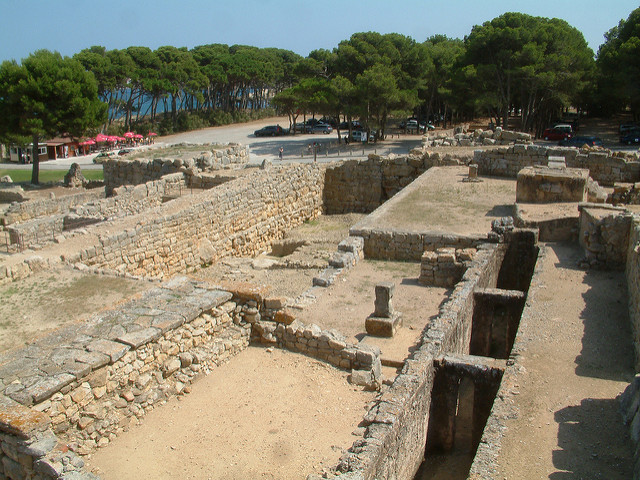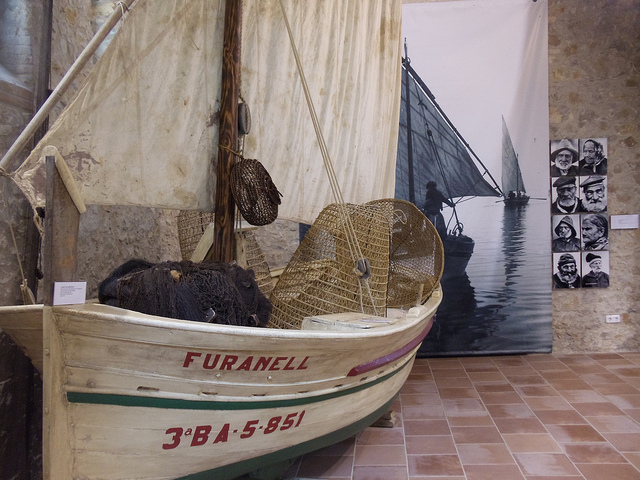L’Escala has museums dedicated to subjects as diverse as archaeology, fishing and motorcycles.
Greco-Roman ruins at Empúries
Carrer Puig i Cadafalch
Founded by Greek colonists from Phocaea in 575 BC and later occupied by the Romans, Empúries was one of the most important settlements on the Iberian peninsular before losing influence to Barcelona and Tarragona. The city was abandoned in the middle ages because it was vulnerable to pirate attacks from the sea.

The Greco-Roman ruins at Empúries. Photo by Kai-Christian Bruhn.
Systematic excavations began at the site in 1908, organised by the museums of Barcelona, and have continued ever since. Empúries developed in three distinct stages. The first was originally an island and located underneath the village of Sant Martí de Empúries (see below).
The Neapolis and Roman City have been extensively excavated the and are open to the public throughout the year. If you’re interested in Greek or Roman history in particular then it’s definitely worth spending a few hours there and there is plenty of parking available on the site.
Anchovy and Salt Museum
Avinguda Francesc Macià, 1
The economy of l’Escala was historically based on fishing and preserving anchovies, something that the town remains famous for to this day. Although the anchovy industry dates back to the sixteenth century, the method traditionally used in l’Escala was introduced by the Greeks. Rather than using oil to preserve the fish they are cleaned then packed in salt.

Inside the Anchovy and Salt Museum. Photo by Kevin Krejci.
Because of this salt was incredibly valuable to the town and brought in by sailing ship to the anchovy preservers. The Museu de l’Anxova i de la Sal – Anchovy and Salt Museum – is dedicated to the history of fishing and preserving anchovies in l’Escala.
The Albert House
Carrer Enric Serra, 37
One of the best known l’Escala natives is the writer Caterina Albert i Paradís. Most of writing was published under the pseudonym Victor Català following the furore caused when she won a 1898 literary prize for two of her works. The jury was incredulous to learn a young writer from l’Escala could have penned “La infanticida” (Infanticide).
You can visit two houses related to the author in the village. The first was where she was born (the “Albert House”), located on Carrer Enric Serra.
Clos del Pastor
Passeig Lluís Albert, 11
The second house related to Caterina Albert is Clos del Pastor on Passeig Lluís Albert. It was given to her in recognition of her contribution to literature. It now houses the Víctor Català Museum Archives.
Guided tours to both houses are arranged by the Anchovy and Salt Museum.
Fishing Interpretation Centre
Port Pesquer
Located down in the fishing port you’ll find what, in English anyway, goes by the unwieldy name of the Fishing Interpretation Centre. Given that moniker, I had no idea what it was all about either.
The centre is an initiative of the Fishermen’s Guild of L’Escala and provides information on many facets of fishing. Exhibits cover fishing techniques both ancient and modern as well as the daily lives of fishermen and details of fishing boats. The Fishing Interpretation Centre (surely Fishing Education Centre would be better) is open during July and August from 10 am to 1 pm daily and 5 pm to 7 pm Monday to Saturday. During the rest of the year scheduled groups can also visit subject to appointment.
Motorcycle museum
Closa d’en Llop, 9-11
This small museum was founded in 1999 by a l’Escala native who raced motorbikes in his youth, Vicenç Folgado, who died in 2008.
The collection is rather eclectic and although it is small, it still has more than a hundred vintage motorcycles, a handful of antique cars and a rather spectacular model train set and some old toys. The museum also contains the trophies won by Folgado.
The museum is open to groups by appointment only during the winter but can be visited during the summer.

